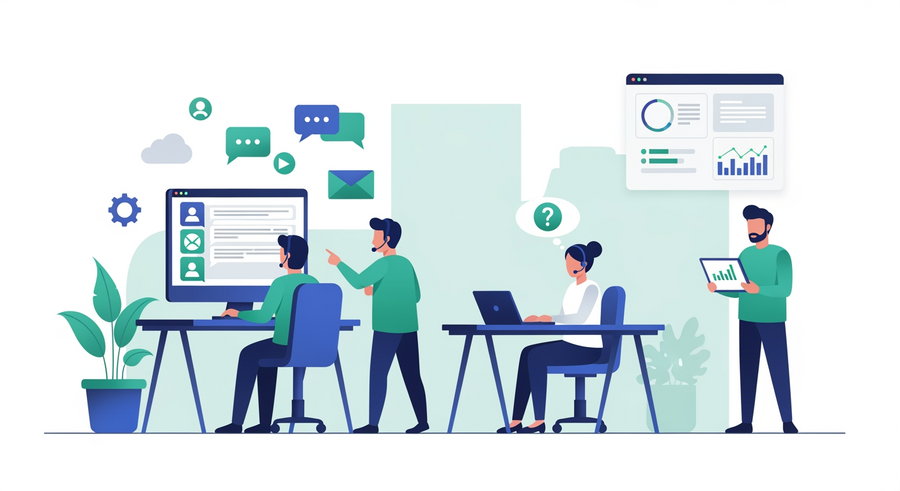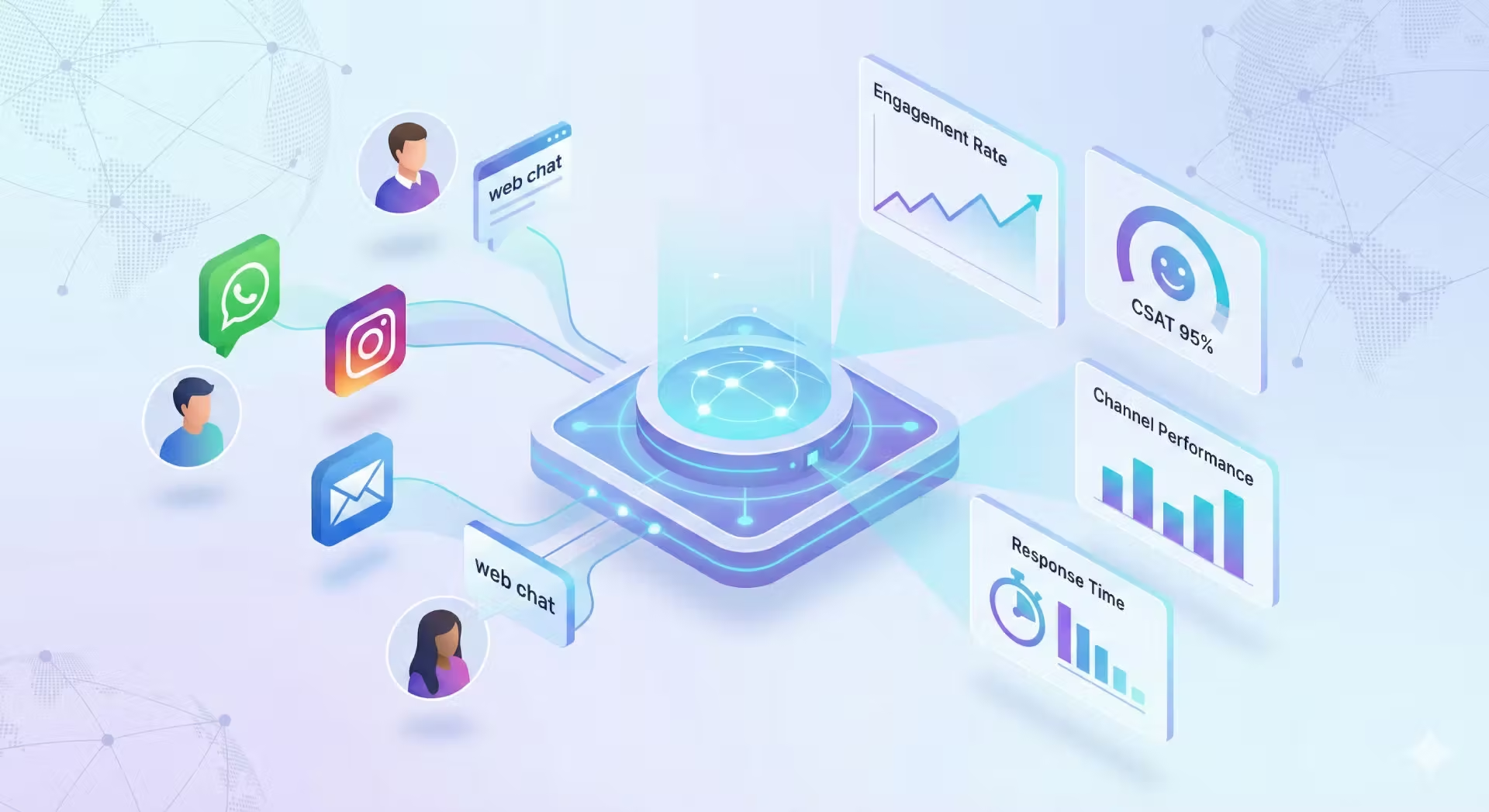AI agents are changing how businesses interact and operate. These tools are transforming industries like real estate, customer service, and sales. Whether you’re a small business owner or managing a large company, there’s an AI agent designed for your needs.
The competition to develop the best AI agents has driven innovation across the tech world. From OpenAI’s ChatGPT to Play.ai’s autonomous tools, there are exciting solutions available. These agents don’t just automate tasks; they offer reliability, scalability, and smarter ways to work.
This guide reviews the top-performing AI agents of 2026. We’ve chosen tools based on their stability, features, and value. Whether you're new to AI or looking for an upgrade, you'll find your perfect match here.
What is an AI agent?
An AI agent is a type of software created to perform tasks without human help. It uses advanced algorithms and machine learning to imitate human actions. These agents are designed to improve over time by learning from new data and experiences.
AI agents are used in many business areas, including sales, marketing, and customer service. In sales, they can talk to potential customers, gather information, and suggest products. In marketing, they help with personalising ads and analysing the results of campaigns. In customer service, they can answer common questions and direct more complex issues to human workers.
Businesses rely on top AI agents to save time and reduce costs. These agents can handle repetitive tasks, such as responding to simple queries or sorting data. By doing this, they allow staff to focus on more important work. This increases productivity and helps companies run more smoothly.
The use of AI agents can also improve customer satisfaction. Customers get quick, accurate responses, which helps build trust and loyalty. Overall, AI agents are becoming essential tools for businesses looking to improve efficiency, cut costs, and provide better service.
Key factors when choosing an AI agent
When choosing an AI agent, it’s important to consider several key factors to ensure it meets your business needs. Not all AI agents are the same, so taking the time to assess these elements will help you make the best choice.
- Ease of use and user interface
Select an AI agent with an intuitive user interface (UI). If the tool is too complex, it can waste valuable time, as employees will need additional training to use it effectively. A simple and clear UI, on the other hand, will boost productivity and help your team get started quickly without unnecessary delays. - Integration with existing systems
Check whether the AI agent integrates smoothly with your existing systems, such as customer relationship management (CRM) tools or email marketing software. Seamless integration is essential for making sure the AI agent works well alongside your current infrastructure. Without proper integration, it may cause disruptions or require additional resources to manage. - Customisation and flexibility
Look for an AI agent that offers customisation options. Your business has unique needs, and having the flexibility to tailor the agent to those requirements will make sure it works efficiently. Customisable features allow you to optimise the agent’s performance and ensure it delivers the results you need. - Scalability and performance
Consider whether the AI agent can handle the growth of your business. Scalable solutions are vital, as they ensure that the tool will still be effective as your company expands. A system that performs well today should be able to handle increased demand in the future without slowing down. - Pricing
Stay within budget by comparing pricing plans. Choose a solution that offers good value for money but avoids compromising on essential features for the sake of saving costs. - Support
Reliable customer support is vital. At some point, you will need help or advice, so make sure the company offers accessible, responsive support. - Security
Data security is a top priority. Select an AI agent with strong security features to ensure that sensitive business information and customer data are protected. - Automated ticket routing
One of the key features to look for in an AI agent is automated ticket routing. This allows the system to automatically direct customer queries to the appropriate department or team member based on the nature of the request. It helps reduce response time and ensures that customer issues are handled efficiently by the right person. This feature is especially useful for businesses that handle a high volume of customer inquiries.
Top 7 AI agents reviewed in 2026
AI agents are transforming the way businesses operate by automating tasks, improving efficiency, and enhancing customer experiences. Here, we review the top AI agents in 2026, highlighting their key features, pros, cons, and pricing to help you choose the right one for your business needs.
1. Trengo - Overall best AI agent
Trengo is an all-in-one communication platform that integrates multiple channels, including chat, email, and social media, into one interface. It allows businesses to automate processes, provide customer support, and manage communication effortlessly. With AI-powered chatbots, it offers automated ticket routing and streamlines customer interactions, making it ideal for businesses of all sizes.
Key Features:
- Unified inbox for all communication channels
- AI-driven automated ticket routing
- Chatbots for instant customer support
- Integration with popular CRM tools
- In-depth analytics and reporting
Pros:
- Easy to set up and use
- Strong integration capabilities
- Scalability for growing businesses
- Robust customer support
Cons:
- Some advanced features require higher-tier plans
- Limited customisation compared to more technical solutions
Pricing: Pricing plans start at £82/month with a free trial available.
2. Voiceflow - Marketing AI agent
Voiceflow focuses on creating conversational AI agents, particularly for voice assistants and chatbots. Its versatility makes it perfect for businesses looking to build multi-modal experiences that work across both voice and text platforms.
Key Features:
- Voice-first design capabilities
- Team collaboration tools
- Integration with Alexa and Google Assistant
- Multi-language support
Pros:
- Best for voice-based AI applications
- Comprehensive documentation
- Developer-friendly tools for custom bots
Cons:
- Can be complex for beginners
- Higher pricing for premium features
Pricing: Starts at £39/month with a free plan for basic use.
3. Botpress - Sales AI agent
Botpress is an open-source platform ideal for enterprise-level AI agent solutions. It offers extensive customisation and advanced natural language processing (NLP), making it a powerful tool for sales automation and complex customer service needs.
Key Features:
- Open-source platform
- Advanced NLP engine
- Integration with popular messaging platforms
- Modular architecture for custom development
Pros:
- High flexibility and customisation
- Free to use with a paid enterprise version
- Active developer community
Cons:
- Steep learning curve
- Requires more technical expertise
Pricing: Free basic version, with team plans starting at £395/month.
Vertex AI agent builder - Enterprise AI agent
Developed by Google Cloud, Vertex AI provides a comprehensive suite of tools for building and deploying AI models. It is ideal for large enterprises that need scalable solutions and integration with machine learning.
Key features:
- Integration with Google Cloud services
- AutoML for custom AI model building
- Scalable infrastructure for large datasets
- Built-in security and compliance features
Pros:
- Strong scalability and performance
- Advanced AI tools and infrastructure
- Ideal for large-scale AI projects
Cons:
- Expensive for smaller businesses
- Requires expertise in machine learning
Pricing: Pricing is on-demand based on usage, with a free trial available.
Microsoft Copilot Studio - Customer service AI sgent
Microsoft Copilot Studio is a no-code platform that integrates with Microsoft’s ecosystem to create AI-driven chatbots. It is especially useful for businesses already using Microsoft products like Teams and Dynamics 365.
Key features:
- No-code development environment
- AI-driven conversation flows
- Seamless integration with Microsoft tools
- Built-in analytics and reporting
Pros:
- Easy integration with Microsoft services
- No coding required
- Strong analytics capabilities
Cons:
- Limited to the Microsoft ecosystem
- Restrictive for highly customised solutions
Pricing: Starts at £23/month per user.
Drift - Sales and marketing AI agent
Drift is a marketing and sales-focused AI agent that helps businesses engage with website visitors in real-time. Its AI chatbots can qualify leads, schedule meetings, and even provide product recommendations.
Key features:
- AI chatbots for lead qualification
- Integration with CRM tools
- Real-time engagement on websites
- Analytics and performance tracking
Pros:
- Excellent for lead generation and sales automation
- Real-time conversation capabilities
- Easy integration with CRMs
Cons:
- Expensive for small businesses
- Limited support for complex workflows
Pricing: Plans start at £40/month.
Ada - AI customer service agent
Ada is an AI agent focused on customer support automation. It provides businesses with the ability to create AI-powered chatbots that can handle repetitive queries, allowing customer service teams to focus on more complex tasks.
Key features:
- No-code chatbot builder
- AI-driven customer support automation
- Integration with various messaging platforms
- In-depth reporting and analytics
Pros:
- Quick to set up and use
- Effective for automating customer service
- Strong support team
Cons:
- Less suitable for complex customer queries
- Some limitations in customisation
Pricing: Pricing starts at £24/month.
Advanced AI agents use cases and applications
AI agent builders are powerful tools that support a wide variety of advanced applications. These applications are transforming industries by enhancing efficiency and providing innovative solutions. Here are some notable examples of how the best AI agents are used:
1. Chatbots: AI agents can create chatbots that provide 24/7 customer support. These chatbots handle complex inquiries and offer personalised recommendations, improving customer satisfaction and reducing the workload for staff.
Example: Trengo AI Helpmate — An AI-driven chatbot that assists businesses in managing customer interactions across multiple channels, ensuring prompt and accurate responses.
2. Creative Writing Assistants: AI can help content creators by developing writing assistants that generate high-quality content. This includes blog posts, social media updates, and articles, saving time and ensuring consistency.
Example: Copy.ai — An AI-powered tool that helps users create engaging content quickly, offering various templates and styles to suit different needs.
3. Image Generators: AI agents can also be used to create image generators that produce high-quality visuals. These include product images, logos, and graphics for use in marketing and branding efforts, improving visual content production.
Example: DALL·E 3 – Developed by OpenAI, this AI system generates realistic images and art from textual descriptions, aiding businesses in creating unique visual content.
4. Virtual Assistants: AI-powered virtual assistants can manage tasks like scheduling appointments, sending emails, and making calls. This helps businesses improve productivity and streamline daily operations.
Example: Motion – An AI personal assistant that intelligently schedules tasks and meetings, helping users manage their time efficiently.
5. Predictive Maintenance: AI agents can be used for predictive maintenance applications. By forecasting potential equipment failures, businesses can reduce downtime and ensure timely maintenance, boosting productivity.
Example: DETECTA 2.0 – An AI-driven system that provides predictive and cyber-secure maintenance solutions for SMEs, enhancing equipment reliability and operational efficiency.
With AI agent builders, developers can create advanced applications that automate repetitive tasks, deliver personalised experiences, and offer continuous support, making them indispensable for modern businesses.
Final words
AI agents are here to stay. They simplify tasks, save time, and boost productivity by automating routine processes, allowing employees to focus on more important work. From handling customer support queries to managing complex workflows, AI agents make business operations more efficient. These tools are designed to enhance performance, helping businesses reduce costs and increase overall productivity.
Among the many available options, Trengo stands out as the best AI agent. Its versatility and ease of use make it ideal for businesses of all sizes. Whether you're a small startup or a large enterprise, Trengo simplifies communication, automates tasks, and integrates seamlessly with existing systems.
As one of the top AI agents, Trengo offers powerful features without being complex, helping businesses save time and work smarter.
Ready to transform your operations? Choose the right AI agent today and experience the power of automation.
Frequently asked questions
Why are AI agents becoming important in 2026?
AI agents are essential in 2026 as businesses seek to automate routine tasks, improve customer engagement, and scale support & sales operations efficiently. They provide faster responses, personalised interactions, and data-driven insights, which are crucial for competitive advantage. Trengo exemplifies this by integrating AI across channels, enabling omnichannel automation and smarter workflows that boost operational productivity.
How do I know if my organisation is ready to adopt an AI agent?
Indicators include high volumes of repetitive queries, the need for 24/7 availability, challenges in scaling customer support, and a readiness to invest in new technology and training. Organisations with unified communication needs and digital maturity are best positioned. Trengo helps with easy AI onboarding and a no-code journey builder, reducing barriers to adoption.
Which are the top AI agents available in 2026 and what makes them stand out?
Top AI agents in 2026 include Trengo AI Helpmate, Zendesk Answer Bot, Freshdesk Freddy AI, Voiceflow, Botpress, Intercom Resolution Bot, and Chatsonic. Trengo stands out for its unified inbox, smart ticket routing, multi-channel capability, customisable no-code chatbots, and integration with popular CRMs, making it highly scalable and user-friendly.
What kind of data, processes or systems must I prepare before deploying an AI agent?
Prepare historical customer interaction data, FAQs, and knowledge bases for training. Ensure integration with your CRM, helpdesk, and communication channels. Standardised workflows and clear escalation policies are vital. Trengo supports pulling data from multiple sources and building automated conversation flows aligned with your existing processes.
What metrics and KPIs should I track to measure the success of an AI agent?
Track first response time, resolution rate, ticket deflection rate, customer satisfaction (CSAT), bot containment rate, and escalation frequency. Trengo’s dashboard provides real-time analytics combining AI and human agent performance, enabling continuous optimisation.
How does Trengo enable businesses to route between AI agents and human agents based on complexity or escalation?
Trengo uses AI to automatically triage conversations, handling common questions with chatbots and escalating complex or sensitive issues to human agents seamlessly within the same interface. Smart routing and collaboration tools ensure the right person addresses each query promptly, maintaining conversation context for higher satisfaction.




.png)











